Related Research Articles
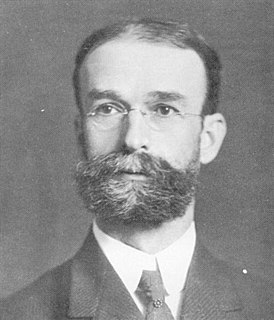
Prof Theobald Smith FRS(For) HFRSE was a pioneering epidemiologist, bacteriologist, pathologist and professor. Smith is widely considered to be America's first internationally-significant medical research scientist.

The Royal Society of Edinburgh is Scotland's national academy of science and letters. It is a registered charity that operates on a wholly independent and nonpartisan basis and provides public benefit throughout Scotland. It was established in 1783. As of 2021, there are around 1,800 Fellows.

John Wishart was a Scottish mathematician and agricultural statistician.
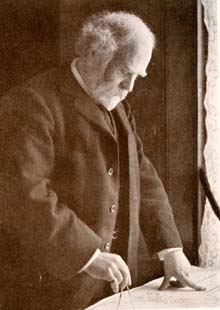
Sir John Murray was a pioneering Canadian-born British oceanographer, marine biologist and limnologist. He is considered to be the father of modern oceanography.
Captain Sir Samuel Brown of Netherbyres KH FRSE was an early pioneer of chain design and manufacture and of suspension bridge design and construction. He is best known for the Union Bridge of 1820, the first vehicular suspension bridge in Britain.

Rear admiral Sir William Watson Cheyne, 1st Baronet, was a Scottish surgeon and bacteriologist, who pioneered the use of antiseptic surgical methods in the United Kingdom.

Sir John Graham Kerr, known to his friends as Graham Kerr, was a British embryologist and Unionist Member of Parliament (MP). He is best known for his studies of the embryology of lungfishes. He was involved in ship camouflage in the First World War, and through his pupil Hugh B. Cott influenced military camouflage thinking in the Second World War also.

Ramsay Heatley Traquair FRSE FRS was a Scottish naturalist and palaeontologist who became a leading expert on fossil fish.
Hugh Robert Mill was a British geographer and meteorologist who was influential in the reform of geography teaching, and in the development of meteorology as a science. He was President of the Royal Meteorological Society for 1907/8, and President of the Geographical Association in 1932.
Thomas Jones Mackie FRSE LLD CBE was a noted Scottish bacteriologist; Dean of the Faculty of Medicine, University of Edinburgh; and author of medical research textbooks.
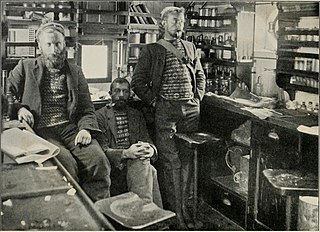
Dr James Hunter Harvey Pirie FRSE FRCPE was a 20th-century British medical doctor, philatelist, orchid-grower and bacteriologist. Pirie named the bacterial genus Listeria in honor of Joseph Lister and the Pirie Peninsula is named after him. Cape Mabel was named after his wife. In authorship he is known as J. H. H. Pirie.
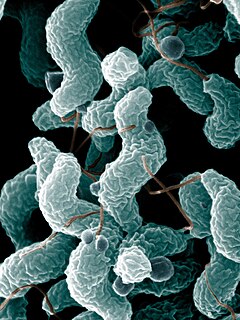
Sir John McFadyean FRSE LLD was a Scottish veterinary surgeon and Professor of Veterinary Science. He was Principal of the Royal Veterinary College from 1894 to 1927.
Sir Kenneth Lyon Blaxter FRS PRSE FIBiol was an English animal nutritionist.

Nora Lilian Alcock, also known as Nora Lilian Lepart and Nora Lilian Leopard, was a pioneer in the field of plant pathology and the first government-appointed plant pathologist in Scotland.
Prof David Ellis FRSE (1874–1937) was a Scottish bacteriologist, botanist and baker. He was an academic author in all three fields.
Dr Charles Edward Foister FRSE was a British botanist and plant pathologist. He was Director of Scottish Agricultural Scientific Services in Edinburgh from 1957. He specialised in lichens and fungi.

Sir Alexander Cruikshank Houston KBE CVO FRS FRSE LLD was an expert on water supply and public health, of Scottish ancestry, who rose to be Director of Water Examination for London's Metropolitan Water Board.
William Christopher Miller FRSE was a 20th century British veterinary surgeon and author. He was President of the National Veterinary Association in 1940.
Dr James Mackay Shewan LLD CBiol FIFST (1909–1988) was a 20th-century Scottish chemist, bacteriologist and amateur historian. He was Head of the Torry Research Station near Aberdeen.
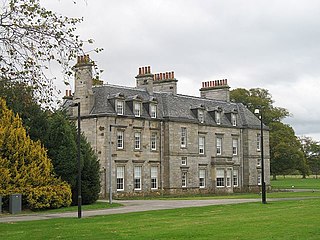
Sir Stephen John Watson FRSE FRIC FRAgS CBE was a 20th-century British agriculturalist. He had an expert knowledge of the nutritional values of hay, straw and silage under different conditions.
References
- 1 2 Biographical Index of Former Fellows of the Royal Society of Edinburgh 1783–2002 (PDF). The Royal Society of Edinburgh. July 2006. ISBN 0-902-198-84-X.
- ↑ "Deaths". The Times. No. 58565. 29 August 1972. p. 20.